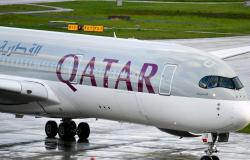Israel struck the southern Gaza Strip on Monday after 20 rockets were fired into its territory by Palestinian fighters who have been targeted for nearly nine months by a major Israeli offensive.
Israeli Prime Minister Benjamin Netanyahu spoke on Sunday of a “difficult fight” in the small besieged Palestinian territory, where his army launched its offensive in response to an unprecedented bloody attack by the Palestinian Islamist movement Hamas against Israel on October 7.
In recent months, the army has claimed to have dismantled the command structure of Hamas and its main ally, Islamic Jihad, in northern Gaza and Khan Younis, the largest city in the south, and withdrawn its troops from those areas. But it has resumed operations in several northern areas to fight Palestinian groups again.
On Monday, the al-Quds brigades, the armed wing of Islamic Jihad, claimed responsibility for firing rockets at Israeli communities around the Gaza Strip “in response to the crimes of the Zionist enemy against our Palestinian people.”
The army reported a salvo of “20 projectiles” fired from the Khan Younes region, transformed into a field of ruins during the bombings and fighting. Projectiles were intercepted and others fell in southern Israel, neighboring Palestinian territory, she said.
Israeli forces then “targeted the source of the fire” with artillery, she added, without reporting any casualties.
– “Combat difficile” –
For the 5th consecutive day, the Israeli army is continuing a new operation in Choujaiya, a district of Gaza City, targeted by intense artillery fire on Monday and where violent fighting pitted soldiers against Palestinian groups.
Between 60,000 and 80,000 people, according to the UN, fled the east and north-east of Gaza City after the evacuation order given by the army on Thursday.
According to witnesses, several airstrikes rocked Rafah (south) and the Nousseirat camp (center).
On May 7, Israeli troops launched a ground offensive in the city of Rafah, then touted by Israel as Hamas’ last major stronghold, causing hundreds of thousands of Palestinians to flee.
“Our forces are in operation in Rafah, Shujaiya, everywhere in Gaza,” declared Benjamin Netanyahu, a week after affirming that “the intense phase” of the war was coming to an end.
“Dozens of terrorists are eliminated every day. It is a difficult fight that we are waging on the ground, sometimes hand-to-hand, and also underground,” he said, referring to the tunnels dug underground by Hamas. since taking power in Gaza in 2007.
– Palestinian detainees released –
On Monday, dozens of Palestinian prisoners, including the director of al-Chifa hospital in Gaza City, Mohammed Abou Salmiya, were released by Israel, according to a Palestinian medical source.
An AFP correspondent in Deir el-Balah saw some of them reunited with their loved ones and hugging them at the Al-Aqsa Martyrs Hospital in Deir al-Balah (center) where they were transferred.
Mr. Netanyahu says he wants to continue the war until the elimination of Hamas and the release of all the hostages kidnapped during the October 7 attack in southern Israel.
The attack resulted in the deaths of 1,195 people, mostly civilians, according to an AFP tally based on official Israeli data. Of the 251 people kidnapped during the attack, 116 are still being held hostage in Gaza, of whom 42 are dead, according to the army.
Israel has vowed to destroy Hamas, which it considers terrorist, along with the United States and the European Union. Its offensive in Gaza has so far left 37,877 dead, mostly civilians, according to data from the Health Ministry of the Hamas-led Gaza government.
– Humanitarian disaster –
The war has caused massive population displacements and a humanitarian catastrophe in Gaza, where the Israeli army is besieging the approximately 2.4 million inhabitants who live in conditions described as “disastrous” by the UN.
Humanitarian aid is arriving in dribs and drabs and water and food are in short supply. Thousands of children suffer from malnutrition according to the World Health Organization (WHO) which, in mid-June, reported “32 deaths attributed to malnutrition, including 28 among children under five years old” .
In Deir el-Balah, a pharmacist, Sami Hamid, said that “the number of skin infections has increased, especially scabies, and chickenpox has spread, especially due to the heat and lack of clean water. The consequences are disastrous, especially for children.”
The war also raises fears of a conflict between Israel and Lebanese Hezbollah after an increase in attacks on both sides of the Israeli-Lebanese border and an escalation of threats.





